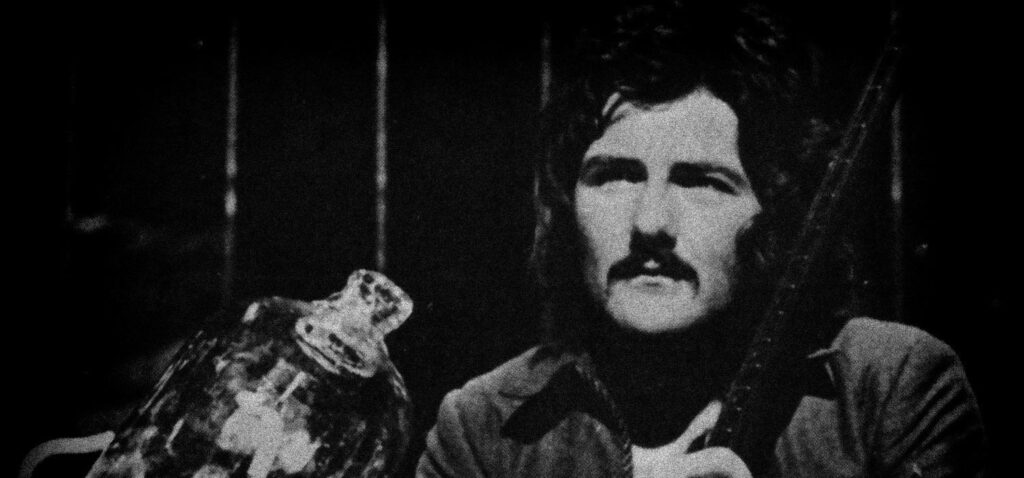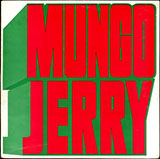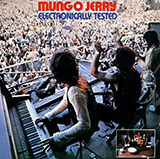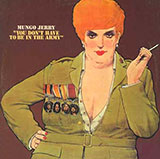Mungo Jerry

In the beginning, we took the music world by storm, not only because of our style of music, but also because of the rough and ready image, and carefree attitude we displayed on and off the stage – we were in fact at this time very unique. We were a hit all the way around the world; from Eskimo’s to Aborigines, they loved us! Mungo, was a blend of us all, colourful, a bit roguish and above all, totally different in the way we sat down and pumped out our earthy but happy-go-lucky style of music.
(Paul King)
Debut Album …
AllMusic Review by Dave Thompson
 Mungo Jerry’s debut album, released hot on the heels of the mega-selling “In the Summertime,” was more or less a straightforward recapitulation of what was already regarded as among the hottest live shows around. Although a handful of concert favorites (“Mighty Man,” for one) were lacking, the kazoo-powered “Maggie,” the pounding country-bop “Johnny B. Badde,” and a barnstorming reworking of “Baby Let’s Play House” were all present and dynamically correct, together with the unequivocally titled “Mother*!*!*! Boogie,” a knock-’em-dead instrumental duet for piano and mouth organ that says as much about Mungo Jerry’s sense of fun as any of the band’s better-known numbers. Although Mungo Jerry is clearly the work of a band still finding its feet, all the hallmarks of the group’s future career are already visible, both good and bad. In the latter category, the songwriting conflict that would eventually see Paul King depart the band is painfully evident, as the haunting “Movin’ On” and “Tramp” deliver melodies and arrangements far from the stamping, hooting, honking glee that was Ray Dorset’s forte. Similarly, the somewhat samey style that would eventually scupper the band he left behind is mapped out by “See Me,” a song that retrospect paints as a virtual medley of every great hit Mungo Jerry ever scored. At this stage, however, such fears and failings were far off in the future, and Mungo Jerry emerges triumphant, a mixed bag of jug-folk-blues that does indeed boogie like a mother*!*!*!
Mungo Jerry’s debut album, released hot on the heels of the mega-selling “In the Summertime,” was more or less a straightforward recapitulation of what was already regarded as among the hottest live shows around. Although a handful of concert favorites (“Mighty Man,” for one) were lacking, the kazoo-powered “Maggie,” the pounding country-bop “Johnny B. Badde,” and a barnstorming reworking of “Baby Let’s Play House” were all present and dynamically correct, together with the unequivocally titled “Mother*!*!*! Boogie,” a knock-’em-dead instrumental duet for piano and mouth organ that says as much about Mungo Jerry’s sense of fun as any of the band’s better-known numbers. Although Mungo Jerry is clearly the work of a band still finding its feet, all the hallmarks of the group’s future career are already visible, both good and bad. In the latter category, the songwriting conflict that would eventually see Paul King depart the band is painfully evident, as the haunting “Movin’ On” and “Tramp” deliver melodies and arrangements far from the stamping, hooting, honking glee that was Ray Dorset’s forte. Similarly, the somewhat samey style that would eventually scupper the band he left behind is mapped out by “See Me,” a song that retrospect paints as a virtual medley of every great hit Mungo Jerry ever scored. At this stage, however, such fears and failings were far off in the future, and Mungo Jerry emerges triumphant, a mixed bag of jug-folk-blues that does indeed boogie like a mother*!*!*!
Electronically Tested …
AllMusic Review by Dave Thompson
 No less than its predecessor, Mungo Jerry’s second album hit the stores in the wake of a massive hit single, the lascivious “Baby Jump” — still one of the most sexually raw records ever to land regular daytime airplay. And, again like its predecessor, the full album proved that the hit was no fluke. Indeed, while Mungo Jerry road-tested the sheer musical versatility of the still-infant band, Electronically Tested (titled for the legend found on British-made packets of condoms) hit the highway with both feet on the accelerator. “Baby Jump” and the later single “Somebody Stole My Wife” are the commercial highlights of the album, of course, the former a thread-by-thread deconstruction of a beautiful woman, the latter a rollicking tale of desertion set to a deliriously drunken boogie. The true gems, however, are a nine-minute marathon stomp through “I Just Wanna Make Love to You,” laced with fuzzed guitar and hard rock growling, and, at the opposite end of the musical spectrum, “Memoirs of a Stockbroker,” a wry look back on a mischievous childhood that has, with the passing years, transformed itself from comic routine to painful confessional. That same song would also title the album’s U.S. release, a set that largely adhered to its British counterpart, but did succeed in shedding one of the album’s finest moments, the gruesome blues “Black Bubonic Plague,” in favor of “Have a Whiff on Me” and “Daddies Brew.” The joyous merits of the former notwithstanding, it’s a lousy exchange. A medieval melodrama that certainly puts our modern coughs and sneezes in perspective, “Black Bubonic Plague” is one of Mungo Jerry’s finest moments, both lyrically and musically, and would reappear the following year as “One Legged Man in a Goldfish Bowl,” from guitarist Paul King’s Been in the Pen Too Long solo album, a reminder that it was the preponderance of Ray Dorset compositions on Electronically Tested that rendered inevitable King’s eventual departure from the band. Though he was a far more versatile songwriter than Dorset, King’s work was increasingly regarded as unsuitable for Mungo Jerry, all the more so once the hits started flying. Still, his “Man Behind the Piano” serves up another of Electronically Tested’s most memorable moments, while the 1991 Repertoire CD reissue appends another King classic, “Little Louis,” among seven bonus tracks drawn from period singles, B-sides, and EP releases. Of the others, three tracks recorded live at the 1970 Hollywood Festival capture the band in full-blooded flood, while the non-LP hit “Lady Rose” joins the aforementioned “Have a Whiff on Me” as a further reminder of Mungo Jerry’s brilliance. With or without these additions, however, Electronically Tested stands as Mungo Jerry’s all-time masterpiece, and a last gasp of rambunctious cohesion before the chaos that would scar the remainder of the band’s career.
No less than its predecessor, Mungo Jerry’s second album hit the stores in the wake of a massive hit single, the lascivious “Baby Jump” — still one of the most sexually raw records ever to land regular daytime airplay. And, again like its predecessor, the full album proved that the hit was no fluke. Indeed, while Mungo Jerry road-tested the sheer musical versatility of the still-infant band, Electronically Tested (titled for the legend found on British-made packets of condoms) hit the highway with both feet on the accelerator. “Baby Jump” and the later single “Somebody Stole My Wife” are the commercial highlights of the album, of course, the former a thread-by-thread deconstruction of a beautiful woman, the latter a rollicking tale of desertion set to a deliriously drunken boogie. The true gems, however, are a nine-minute marathon stomp through “I Just Wanna Make Love to You,” laced with fuzzed guitar and hard rock growling, and, at the opposite end of the musical spectrum, “Memoirs of a Stockbroker,” a wry look back on a mischievous childhood that has, with the passing years, transformed itself from comic routine to painful confessional. That same song would also title the album’s U.S. release, a set that largely adhered to its British counterpart, but did succeed in shedding one of the album’s finest moments, the gruesome blues “Black Bubonic Plague,” in favor of “Have a Whiff on Me” and “Daddies Brew.” The joyous merits of the former notwithstanding, it’s a lousy exchange. A medieval melodrama that certainly puts our modern coughs and sneezes in perspective, “Black Bubonic Plague” is one of Mungo Jerry’s finest moments, both lyrically and musically, and would reappear the following year as “One Legged Man in a Goldfish Bowl,” from guitarist Paul King’s Been in the Pen Too Long solo album, a reminder that it was the preponderance of Ray Dorset compositions on Electronically Tested that rendered inevitable King’s eventual departure from the band. Though he was a far more versatile songwriter than Dorset, King’s work was increasingly regarded as unsuitable for Mungo Jerry, all the more so once the hits started flying. Still, his “Man Behind the Piano” serves up another of Electronically Tested’s most memorable moments, while the 1991 Repertoire CD reissue appends another King classic, “Little Louis,” among seven bonus tracks drawn from period singles, B-sides, and EP releases. Of the others, three tracks recorded live at the 1970 Hollywood Festival capture the band in full-blooded flood, while the non-LP hit “Lady Rose” joins the aforementioned “Have a Whiff on Me” as a further reminder of Mungo Jerry’s brilliance. With or without these additions, however, Electronically Tested stands as Mungo Jerry’s all-time masterpiece, and a last gasp of rambunctious cohesion before the chaos that would scar the remainder of the band’s career.
You Don’t have to Be In the Army …
AllMusic Review by Dave Thompson
 Bedecked with one of the most terrifying covers of the early ’70s — a vast, bemedalled military harridan striking a scornful pose of “come and get it” allure — Mungo Jerry’s third U.K. album was titled for one of their best-loved (but, contrarily, least-successful) hit singles, a saga of all the things that can and will go wrong as you try to live your daily life. This album, though the song doesn’t mention it, would appear to be one of them. From beginning to end, it is one of their weakest, with Ray Dorset now firmly entrenched in writing according to the established band style and Paul King simply squeezing in his less-typical songs where he can. That he was saving the best for his own forthcoming solo album seems blatantly obvious, though — his “Hey Rosalyn” is no more a shining triumph than Dorset’s “Pigeon Pie” and “Give Me Love,” and it’s telling that the best songs on the album are the traditional pieces, “Ella Speed” and “Take Me Back.” Mungo Jerry would bounce back (briefly), and You Don’t Have to Be in the Army’s defeat would quickly be forgotten. At the time, however, it was difficult not to believe that the summertime was finally over.
Bedecked with one of the most terrifying covers of the early ’70s — a vast, bemedalled military harridan striking a scornful pose of “come and get it” allure — Mungo Jerry’s third U.K. album was titled for one of their best-loved (but, contrarily, least-successful) hit singles, a saga of all the things that can and will go wrong as you try to live your daily life. This album, though the song doesn’t mention it, would appear to be one of them. From beginning to end, it is one of their weakest, with Ray Dorset now firmly entrenched in writing according to the established band style and Paul King simply squeezing in his less-typical songs where he can. That he was saving the best for his own forthcoming solo album seems blatantly obvious, though — his “Hey Rosalyn” is no more a shining triumph than Dorset’s “Pigeon Pie” and “Give Me Love,” and it’s telling that the best songs on the album are the traditional pieces, “Ella Speed” and “Take Me Back.” Mungo Jerry would bounce back (briefly), and You Don’t Have to Be in the Army’s defeat would quickly be forgotten. At the time, however, it was difficult not to believe that the summertime was finally over.
More Reviews
Music Press, 1971
An extremely satisfying album from Mungo Jerry, which makes an excellent follow-up to 'Electronically Tested'.
The band really have been misjudged in the past as their latest album has far more to recommend it than simply the spirit in which it was recorded.
It opens with the now familiar title track and then rips into the old Leadbelly classic 'Ella Speed'.
In another old number, 'Take Me Back', they achieve a superb Cajun feel whilst the 'traddies' are complemented by some fine Ray Dorset compositions and Paul King's excellent 'Hey Rosalyn'.
Mungo run the whole gamut from blues through to rock'n roll. 'Northcote Arms' being a superb example of the latter.
They also include several other tracks which will be familiar to blues enthusiasts such as Leadbelly's 'Keep Your Hands Off Her' and 'There's a Man Going Round Taking Names' as well as Woody Guthrie's 'That Old Dust Storm'.
It's a really good stomping album.
NME, 16th October, 1971
The time is approaching one suspects when the goodtime heroes of Newcastle Under-Lyme will have to decide how rigidly they wish to conform to jug band style. For the sound which had people on their feet and dancing to 'In The Summertime' is beginning to wear thin on record.
The material on this album is all great, foot-tapping stuff but at least on the heavier rock 'n roll of 'Northcote Arms' and 'Give Me Love' (both Ray Dorset songs) the absence of strong bass lines and the scanty attention given to Ray Dorset's singing detracts from the quality and impact.
Instrumentally, Mungo are halfway to stronger music with Dorset playing some attractive vintage electric guitar. He's also written the majority of the songs and quite effectively too.
In expressing himself simply he has said quite a bit more than those songwriters who tackle abstract concepts inadequately .
The title track informs you that anything from being ejected from your girls house for having long hair to being kicked by Her Majesty's Constabulary is part of your own little backdoor war.
Paul King has written a good song in 'Hey Rosalyn' and Guthrie's 'That Old Dust Storm' is included.